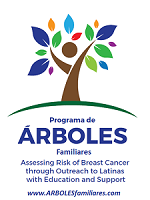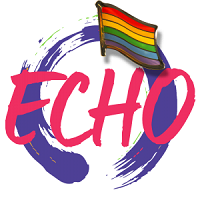Current Research
Advancing Clinical Trials: Working through Outreach, Navigation and Digitally Enabled Referral and Recruitment Strategies (ACTWONDER2S)
Recent FDA data on enrollment to cancer therapeutic trials revealed lower trial participation rates among Black and Hispanic cancer patients relative to the cancer burden among these groups. These findings suggest the need to develop novel strategies to increase participation among racial and ethnic minority populations. This project aims to develop and implement a multi-level intervention to increase referral and recruitment of Black and Hispanic patients to NCI-sponsored therapeutic clinical trials (CTs). The ACT WONDER2S intervention will be delivered through community health educator (CHE) led outreach and navigation coupled with digital interventions for the community patient, community physician, and cancer center physician.
Assessing Risk of Breast Cancer through Outreach to Latinas with Education and Support (ARBOLES)
This training program aims to educate bilingual community health workers, promotoras, health educators, and patient navigators working with Latina women in the community. Through a 16-week training course (online and in-person) participants will gain the skills to increase their knowledge about genetics, genetic counseling and testing, identifying high risk Latinas, and making appropriate referrals for at-risk women. To learn more information or apply, please visit https://arbolesfamiliares.org/

Community Outreach: Novel Tracking of Individuals to Understand and Assess Results (CONTINUAR)
The purpose of this study is to help researchers assess changes in short term cancer prevention, beliefs, intentions, screening behaviors, and interest among community members in research participation. Currently not accepting new participants.
Enriching Communication Skills for Health Professionals in Oncofertility (ECHO)
As survivorship for Adolescent and Young Adult {(AYA); (ages 15-45)} oncology patients improves, there is a greater need to address quality of life issues, particularly in the area of reproductive health. ECHO is a web-based training program that includes psychosocial, biological, clinical, and skill building modules to help allied health professionals (physician assistants, nurses, social workers and psychologists) communicate timely and relevant information regarding reproductive health issues (e.g., fertility, sexuality, body image) to their adolescent and young adult (AYA) oncology patients.

ECHO Bioethics Supplement
Little is known about AHPs’ awareness of posthumous assisted reproduction, institutional policies, and the role they may play in assisting patients, partners, or families in decision-making about fertility preservation in the terminally ill and future posthumous assisted reproduction decisions.
The purpose of this supplement is to: 1) Explore ENRICH/ECHO trainees’ awareness, perceptions, and experiences of fertility preservation (FP) among the terminally ill and posthumous assisted reproduction, and related institutional policies; 2) Identify needs for ethics-based curricula related to fertility preservation among AYA with terminal cancer and posthumous assisted reproduction.
This exploratory endeavor will aid in expanding and improving ECHO with our future trainees, allowing us to prepare new content on issues related to fertility preservation with terminally ill AYA and posthumous reproduction, and to disseminate our findings to the broader oncology care community.
LOvE (LGBT Oncofertility Education) ECHO Supplement
We are expanding the existing ECHO Training Program curriculum to prepare new content for future trainees on the importance of collecting sexual orientation and gender identity (SOGI) data and applying this to the psychosocial care of sexual and gender minority (SGM) adolescent and young adult (AYA) with cancer. Less is known about whether reproductive health needs of SGM AYA with cancer differ vastly from cisgender/heterosexual AYA but growing evidence would suggest SGM would like to have safe spaces in which to disclose SOGI and have their needs addressed. Additionally, multiple recent studies suggest the majority of health professionals did not receive training on the care of SGM with cancer and are often uncertain how to ask SOGI intake questions, why they should be asked and what to do with this information if it is received.
The purpose of this study is to expand the existing ECHO Training Program with Sexual and Gender Minorities adolescent and young adult cancer survivors. The curriculum will be expanded in two key areas: best practices in collecting SOGI data and improving communication about reproductive health with SGM AYA with cancer and survivors.

Florida Community-Engaged Research Alliance Against COVID-19 in Disproportionately Affected Communities (FL-CEAL)
The goal of the Florida Community-Engaged Research Alliance Against COVID-19 in Disproportionately Affected Communities (FL-CEAL) is to establish effective, community-engaged strategies to enhance education, awareness, access, and inclusion of underserved communities in research designed to advance the prevention and treatment of COVID-19 and reduce COVID disparities in the state of Florida. The statewide coalition is led by eleven established investigators whose careers have focused on medically and socially underserved populations. At Moffitt, Dr. Vadaparampil’s FL-CEAL team has focused on: 1) identifying patient and provider knowledge, attitudes, and experiences surrounding COVID and COVID research and clinical trials in West Central Florida 2) identifying barriers and facilitators to COVID research for racial and ethnic minority populations in West Central Florida 3) Developing and disseminating COVID-19 community-based outreach and education for young adults in West Central Florida.
HPV Multilevel Intervention Strategies Targeting Immunization in Community Settings (HPV MISTICS)
HPV MISTICS is a joint effort between Dr. V and Dr. Christy's research teams. This study aims to increase HPV vaccination rates among adolescents aged 11 to 17 by addressing the system, provider, and parent levels. This intervention utilizes parent reminder post cards, physician reminders, and vaccine champions.
Identifying Barriers to HCV Screening in Primary Care Practice (MIGHTY HCV)
The purpose of this study is to understand the barriers to HCV screening for the 1945-1965 birth cohort at the patient, provider and clinic level by conducting interviews with medical providers. Currently not accepting new participants.
A Mixed-Methods Approach to Identify Motivators, Facilitators, and Barriers of Receipt of High-Quality Foregut Cancer Treatment (FORCE)
The purpose of the study is to identify motivators, facilitators, and barriers to accessing standard of care treatment for foregut cancer patients undergoing curative-intent surgical procedure. Currently not accepting new participants.
Patient Activation Toolkit for HCV Screening (HCV PATHS)
The purpose of the study is to refine a Patient Activation Toolkit to enhance awareness of hepatitis C virus (HCV) screening and testing as a strategy for hepatocellular carcinoma (HCC) prevention and reduction of HCV associated mortalities through interviews. For more information or see if you qualify, please contact HCVPATHS@moffitt.org
Palliative Care Experiences in Gynecologic Oncology (PACE-GYN)
Palliative care interventions improve quality of life and promote prolonged survival. Patients with ovarian cancer are an ideal population for palliative care intervention. Ovarian cancer patients often develop life altering side effects, which oncology providers spend a significant amount of time palliating. Furthermore, the majority of patients with recurrent ovarian cancers will not be cured. Palliative care providers can aid in symptom management, setting goals of care, and end of life planning. However, there is a dearth of research on palliative care in the context of gynecologic oncology. Thus, the purpose of the study is to understand the reasons why women with recurrent ovarian cancer do or do not use palliative care services. Results of this study will inform the development of interventions to promote palliative care utilization.
Understanding Patient and Provider Perspectives on Vaccine Based Treatment Trials (CIIRC Pilot)
The purpose of the study is to assess patient-reported barriers to completion of cervical cancer treatment and clinical trials for cervical cancer treatment, as well as to assess provider-reported acceptability of novel therapeutic approaches to cervical cancer treatment.
Provider Response and Opinions of Guidelines Related to Screening Strategies (CC PROGRESS)
This project focuses on exploring physician practices and preferences related to screening for one of the most common HPV-related cancers—cervical cancer and physician perceptions of screening guidelines. The ultimate goal of this project will be to work with the American Society of Colposcopy & Cervical Pathology (ASCCP) and utilize project results to inform cervical cancer screening guideline revisions.

U54 Ponce Health Science University and Moffitt Cancer Center Partnership (PHSU-MCC)
The PHSU-MCC Partnership is a collaboration between Moffitt Cancer Center and Ponce Health Sciences University to reduce cancer health disparities among Hispanic/Latinos. The PHSU-MCC Partnership's Community Outreach Team focuses on increasing awareness of cancer prevention, early detection, treatment, and research among Hispanics. To do so, the team offers free educational events for Hispanic communities in the Ponce, Puerto Rico, and Tampa Bay areas that focus on community engagement, cancer education, and capacity building. For more information or to learn more about our upcoming events, please visit our website.

Understanding the Impact of COVID-19 on Cervical Cancer Screening and Management of Abnormal Results in Underserved Women (ACS TLC Supplement)
This project is focused on examining current practices related to cervical cancer screening and management of abnormal screening test results, barriers and facilitators of guideline adoption, and practice changes related to the COVID-19 pandemic. This information will then be used to inform the development of interventions to improve guideline-adherent care among vulnerable populations. We are focused on surveying providers and clinical leaders in safety net settings (Federally Qualified Health Centers-FQHCs) to determine their knowledge of and attitudes toward current guidelines and their experiences providing cervical cancer screening services during the COVID-19 pandemic. The 2nd phase of this project involves interviewing providers to explore how the pandemic affected their ability to provide care and implement new guidelines during the COVID-19 pandemic and gather ideas from providers for ways to optimize cervical cancer prevention.
Past Projects/Research
Advancing Equity in Colorectal Cancer Genetic Risk Prediction through Expansion of Racial/Ethnic Minority Representation (ACCELERATE)
Colorectal cancer remains one of the leading causes of cancer death and new approaches are of vital importance to make clinical inroads in reducing the burden of this lethal disease. This study will develop a comprehensive risk prediction model based on genetic and environmental/lifestyle risk factors in a racially/ethnically diverse population which will correct the Euro-centric bias. To translate this transethnic risk prediction model into clinical practice, we will use microsimulation modeling to personalize screening recommendations based on genetic and environmental risk factor information and we will develop a web-based risk communication tool which we will evaluate in racially/ethnically diverse participants. Results from our study will ensure that targeted personalized interventions will confer equitable benefits for all regardless of their ethnicity or race.
Fertility, Reproduction, and Genetics: Increasing Learning through Education (FRAGILE)
This project is focused on Adolescent and Young Adult (AYA) cancer patients and AYA providers and aims to understand: what AYA cancer patients and healthcare providers discuss about genetic risk and reproductive health; patients’ concerns regarding their reproductive health, fertility, and genetic risk; and patient and healthcare providers’ recommendations for educational materials regarding reproductive health and fertility. The ultimate goal of this project is to create a learning tool for Adolescent and Young Adult patients regarding the intersection between fertility and genetics to help inform decisions about future family building options.

Ovarian Cancer: Developing and Implementing Referral and Expanding Cascade Testing (OC DIRECTS)
This study will assess factors and interventions related to substandard guideline-concordant care for genetic testing of ovarian cancer patients. Moffitt Cancer Center has only had about a 28.5% genetic testing rate, even though the guidelines clearly state 100% of all women with ovarian cancer should be tested. Nationwide, rates are about 20-30%. The purpose of this study is to identify barriers and develop strategies to increase genetic uptake for referral and testing among ovarian cancer patients at Moffitt Cancer Center.
U54-HPV Study
This study aims to conduct a series of individual interviews with caregivers of adolescents in Tampa and Ponce in order to explore barriers and facilitators to vaccine series completion. In addition to assessing the impact of policy change on HPV vaccine series initiation and completion among adolescents in Puerto Rico.
